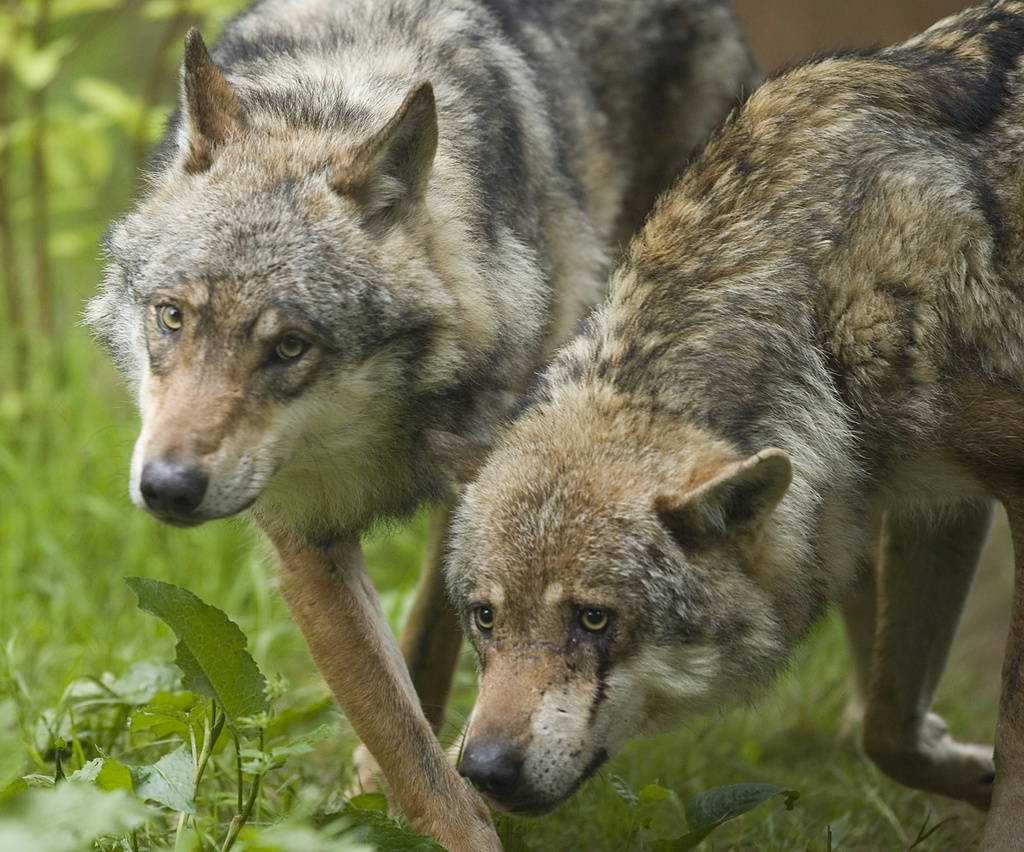Wolf killer bounty shows divisions over conservation

A hefty reward for information about the shooting of a wolf has highlighted deep divisions on the re-establishment of predators in the Swiss countryside. The Wolf Group of Switzerland (GWS) offered up the bounty after the animal was found dead on January 3.
Wolves had not been seen in Switzerland for around 120 years until small numbers started to reappear in the mid-1990s. They are now a strictly protected species under the Bern Convention, an international agreement on wildlife conservation.
The animals attract a great deal of attention in the media when they are spotted or suspected of attacking other animals. A pack of ten wolves was caught on camera in canton St Gallen last November.
There are now at least 23 wolves in Switzerland, which have mainly crept back into the country from Italy, causing tension between animal lovers and livestock owners.
Though farmers demand that the protection of their livestock and livelihood take precedent over a conservation programme, there are strict rules governing the treatment of wolves under Swiss law as a result of the convention. Cantonal permits can be obtained to shoot one of the predators if it causes major damage, but only if it has killed more than 35 sheep over a four-month period or 25 in one month.
The Federal Office for the Environment told swissinfo.ch that eight wolves have been killed under such authorisations since 1995.
Livestock killings
Since early December a number of sheep have been killed by a wolf in the western canton of Vaud, where wolves had not been observed for a long time. In October, sheep were also killed in canton Uri, with a wolf thought to be the likely culprit in this case too.
DNA evidence is often analysed to determine whether or not a wolf was involved, though it is not always possible to come up with a definitive answer.
After a small number of recent, similar incidents in canton Graubünden, someone took matters into their own hands and shot a wolf. The animal died slowly over a number of days, making it the straw that finally broke the camel’s back for the GWS.
“We really want to increase the pressure on poachers,” the group’s president David Gerke told swissinfo.ch
“This is the first time in a long while that a wolf has been illegally killed – the last time was in 2006 in canton Ticino. We thought about offering a bounty then, but for various reasons, eventually decided against it. This time it’s different.”
The group is offering CHF5,000 ($5,500) of its own funds and CHF5,000 from donations to the person who can provide information or evidence leading to the arrest of the shooter.

The incident was especially distressing, Gerke added, because the pack of wolves the animal belonged to had not caused any problems.
“Leads that we receive – and we have already received a few – will be handed over to the public prosecutor in canton Graubünden. We will not make these leads public, we will merely pass them on,” he said.
The group claims to have received five tip-offs so far.
The authorities in Graubünden have instructed the cantonal prosecutor, Maurus Eckert, to investigate the case.
“The charges will focus on the elements of the crime coming under the animal cruelty law,” Eckert told swissinfo.ch “We will investigate the accusation that the wolf wasn’t killed humanely, that it was shot in a way that meant it suffered for a number of days.”
Another part of the investigation will consider whether game laws were violated, as the wolf is a protected animal.
A lack of understanding
It’s a difficult situation for the Swiss Farmers’ Association.
“Clearly we do not support or welcome this. An illegal shooting is an illegal shooting – and that is not OK,” Thomas Jäggi, head of livestock at the association, told swissinfo.ch
“The wolf topic is a major conflict though that needs a real solution. The urban population believes we need to learn to live with the wolf and take all the measures needed to make that happen, but there is no solution on the table, there is no consensus and that’s a problem that has to be solved.”
The environment office admits emotions run high over the issue, but officials say overall, they’re not worried.
“Some people react strongly to the wolf’s return,” Reinhard Schnidrig, head of the office’s wildlife and forest biodiversity section, told swissinfo.ch
“We are not concerned about wolf conservation in Switzerland. There are more and more every year, more packs will be observed in the coming years and the majority of people are in favour of its presence.”
The office is however increasing the amount of money it invests in helping and informing farmers on how to deal with the situation. In 2014, the budget is CHF2 million.

In compliance with the JTI standards
More: SWI swissinfo.ch certified by the Journalism Trust Initiative












You can find an overview of ongoing debates with our journalists here . Please join us!
If you want to start a conversation about a topic raised in this article or want to report factual errors, email us at english@swissinfo.ch.